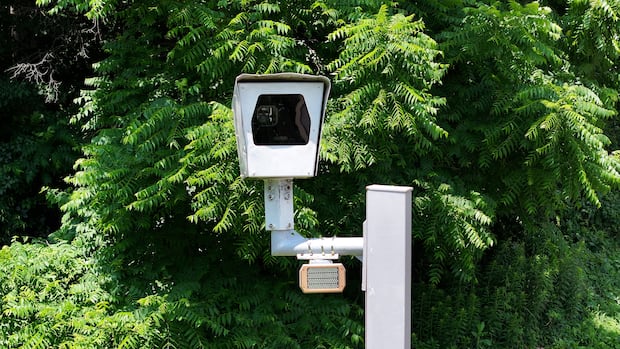Speed cams have cut speeding around Toronto schools nearly in half, new study finds
Study led by SickKids hospital looked at effect of speed cameras deployed across 250 school zones

Automated speed cameras have reduced speeding around Toronto school zones by nearly half, according to a new study.
The study, published in the journal Injury Prevention and led by researchers at The Hospital for Sick Children and Toronto Metropolitan University, looked at the effect of automated speed enforcement cameras deployed across 250 school zones around Toronto from July 2020 to December 2022.
Looking at speeding data in these areas before and after speed cameras were installed, it found that cameras have reduced the proportion of speeding vehicles in urban school zones by 45 per cent.
"We had a very substantial reduction in the speed of the traffic, more than we were expecting to see," said the study's lead author, Dr. Andrew Howard, who is also head of orthopedic surgery for The Hospital for Sick Children.
"And what was especially pleasing about that was that the faster the cars were going, the greater the reduction in speed."
While the proportion of drivers going 10 km/h over the speed limits decreased by 74 per cent, the study found the proportion of drivers going 15 km/h over the limit decreased by 84 per cent. Drivers going 20 km/h or more over the limit fell by 88 per cent, the study found.
The study used pneumatic tubes, which are laid across the road and sense passing cars, to measure speeds in school zones before cameras were installed.
Howard said every kilometre per hour counts in a collision.
"Little reductions in speed mean big reductions in kinetic energy. [That] can mean a difference, literally, between life and death at the type of urban speeds that we're looking at," he said.
"So getting that dangerous kinetic energy out of school zones is very important, and this is very promising."
The study noted that research was done in the first two years of the COVID-19 pandemic, during "unprecedented disruptions" such as school closures, lockdowns and "significant changes in transportation patterns."
"These factors may have affected vehicle speed and volume," read the study. "The observed results, however, strongly argue that [automated speed enforcement] was the primary factor in the speed reductions."
Howard said he hopes reduced speeds in these zones will encourage more children to walk to school, helping to foster a habit of daily physical activity in their lives, which decreases many health risks in old age.
"That's the single most important thing that you can do for this population of kids to make them healthier," he said. "And what we do know is that if you've got more cars going fast around schools, you will have less children walking."
Speed cameras still prompting debate, vandalism
Nearly three-quarters of Ontarians support the use of automated speed enforcement, according to a recent CAA study. It also found 76 per cent of respondents believe cameras deter speeding.
Still, speed cameras in the city have been the source of much debate and backlash.
Earlier this year, Toronto doubled the number of automated speed cameras it uses to 150. But there have been 25 cases of vandalism to speed cameras between 2024 and July 23, 2025, the city told CBC Toronto earlier this week. Eleven of the city's cameras were vandalized in the first week of July alone, including one on Parkside Drive that's been cut down six times in eight months.
Anthony Perruzza, city councillor for Humber River-Black Creek, has said the city's speed camera program should be put on hold until September, calling them "speed traps." He later said he would work with Mayor Olivia Chow on amendments to a city report to the infrastructure committee on Vision Zero, Toronto's road safety strategy.
Council passed a motion last month to install larger, more visible signage around speed cameras, something Perruzza had been calling for. Later this year, a city committee will consider limiting how many tickets a driver can receive from a single camera before they get their first ticket in the mail.
The installation of speed cameras in school zones is part of Toronto's Vision Zero strategy, created in 2016 to eliminate all traffic-related fatalities and serious injuries.



